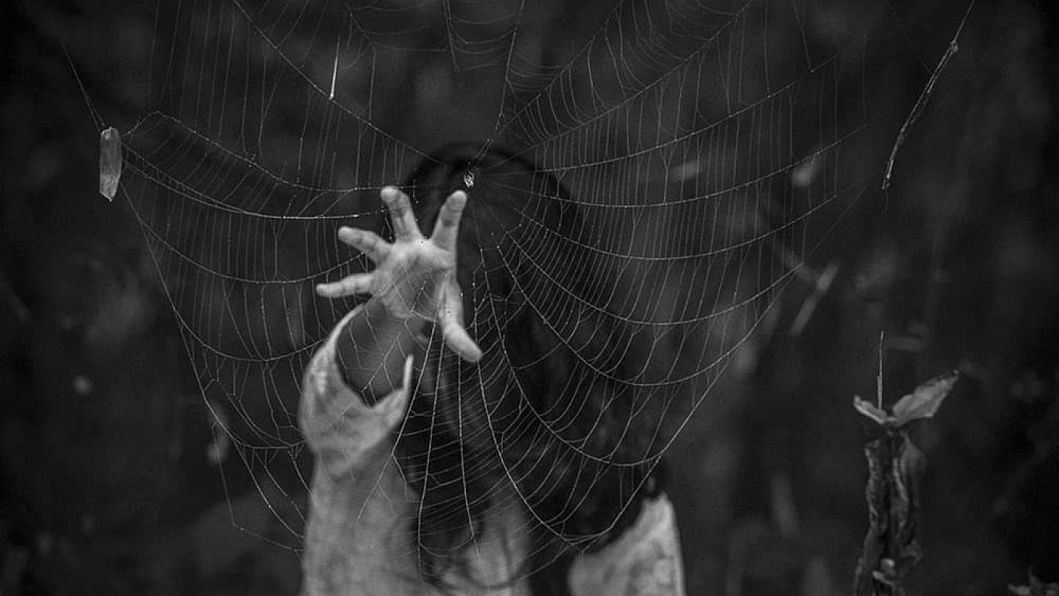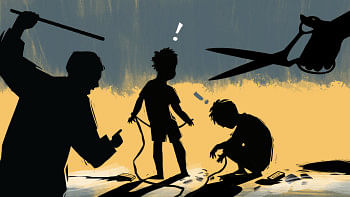Bangladesh’s persistent child abuse woes

In the first three months of 2023, 128 children were killed across Bangladesh, according to data published by legal aid group Ain o Salish Kendra (ASK). During the same period, 225 more children were subjected to various forms of abuse and repression. Among the repressed children, at least 75 were victims of rape, including boys. These deaths and repression have been attributed to a plethora of reasons, ranging from killing after rape, killing after abduction, and killing after torture (in domestic sphere), to torture of underaged domestic workers, torture by law enforcement members, and torture by teachers.
Unfortunately, for our country, this is not a new revelation. ASK, along with other human rights organisations, publish such reports every year, with news outlets reporting the bloody and harrowing details of the crimes against children.
Not every incident comes to light, however. Often, families of the victims choose to suppress these incidents, especially where physical abuse and torture is meted out by family members, extended family members and/or friends and neighbours, fearing social stigma and at times under family pressure. Often, the victimised children refrain from sharing their experiences with even their immediate family members – including parents – fearing castigation and punishment. As a result, these incidents go unrecorded and unpunished, with the child victims living with the nightmare of these experiences for the rest of their lives. Often, these children grow up with emotional and psychological complications, including self-blaming, self-hatred, self-doubt, depression, anxiety, and a constant fear of people.
A 2019 study titled "The Devastating Clinical Consequences of Child Abuse and Neglect: Increased Disease Vulnerability and Poor Treatment Response in Mood Disorders," published in the American Journal of Psychiatry, revealed that 46 percent of people with depression and 57 percent of people with bipolar disorder reported being abused as children. The study found that childhood maltreatment "is also associated with a more pernicious disease course, including a greater number of lifetime depressive episodes and greater depression severity, with the majority of studies showing more recurrence and greater persistence of depressive episodes."
While the point that child abuse leaves a lasting impact on the victims is obvious to most, in many social clusters – especially the fringes – children are continuously subjected to various forms of abuse and maltreatment, with no measure in place to protect them.
Taking a closer look at ASK data since 2020, one would notice that while cases of child abuse has come down year-on-year from 1,718 in 2020, 1,426 in 2021, 1,088 in 2022, to 225 in 2023 (January-March), child killing has hovered above the 500 range, with 589 killings reported in 2020, 596 in 2021, 516 in 2022, and 128 in 2023 (January-March).
While these statistics are concerning, what is even more alarming is the number of cases that are filed each year. Analysing the ASK data, one can see that while cases were filed for 57 percent of incidents in 2020, it came down to 52 percent in 2022 and 41 percent in 2023 (January-March), with the exception in 2021, when it went up to 59 percent. Cases filed for child killing have fluctuated from 44 percent in 2020, 39 percent in 2021, 42 percent in 2022 to 44 percent in 2023 (January-March). These data sets reveal not just our inhibitions in pursuing justice, but also the pitfalls in the law enforcement and justice systems that prevent families from seeking help.
According to a report published in the Financial Express in October 2022, titled "Upswing in women's repression as cases pile up," there were 43,114 cases related to women's repression pending for over five years in 99 women and children repression prevention courts across Bangladesh as of June 30, 2022, and the total number of under-trial cases in these courts was 178,231. This means that more than 24 percent of these cases have been running for more than five years. This data needs to be interpreted in light of the fact that under the provisions of the Women and Children Repression Prevention Act, trials of cases should be completed within 180 days.
Unfortunately, in such cases, every layer of action towards justice is riddled with delays and red tape – from investigation to framing of charges to scheduling of hearings at courts. And the delays get more frustrating in case of rape cases due to the apparently complex process of obtaining medical certificates and DNA reports, since there is no stipulated time frame for obtaining DNA reports per the law.
On top of all this, there is another, more sinister reason why families shy away from filing cases: fear of reprisal from the criminals. Reports of victims and their families being suppressed by the criminals, at times in collusion with dishonest law enforcers, abound in different media, resulting in silence and social injustice.
Victims are also not always aware of the support systems available for them. Case in point: there are nine projects by the women and children affairs ministry to ensure immediate action in cases of torture of women and children. But how many of these projects do we know of? One project that could be a useful tool to provide tangible support to victims is the National Helpline 109. Unfortunately, although the helpline is supposed to provide counselling and services to the victims, they are mostly only capable of providing information, due to a shortage of resources.
It is these limitations – man-made and avoidable – that hinder our ability to protect our children, that hold us back from seeking legal recourse. Also, our own inhibitions in discussing the reality of child abuse with our children leaves them unprepared to handle such a situation, make informed decisions, and speak up if/when they are victimised.
It is up to us as adults to talk to our children and empower them with knowledge and know-how on how best to avoid being in such situations, and what to do in case they are victimised. It is up to the parents and guardians to provide safe space so children can share their deepest and darkest thoughts, their fears and nightmares, so that the adults can help them heal. It is also up to the adults to stand up for the children to ensure that they get justice, despite the pressure and coercion.
And it is up to us as a nation to ensure that our children grow up empowered, healthy – physically, emotionally and mentally – and confident to realise their full potential.
Tasneem Tayeb is a columnist for The Daily Star. Her Twitter handle is @tasneem_tayeb

 For all latest news, follow The Daily Star's Google News channel.
For all latest news, follow The Daily Star's Google News channel. 










Comments